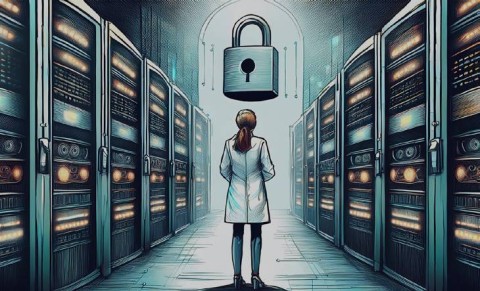Special Issue: Open Science in its many forms - Learning the hard way: lessons from my attempt to implement Open Data Management in a Chemistry consortium
Newsletter
Implementing Open Science in research consortia can be daunting, as I, the project manager, discovered while tackling data management in a chemistry consortium. From technological barriers to institutional resistance, this piece highlights the challenges and lessons learned in navigating FAIR principles and raises questions about the balance of responsibility between individual researchers versus institutional structures.
Bionote
Irène Arrata is the Project Manager at Inserm’s Institute for Translational Medicine and Liver Disease (ITM), University of Strasbourg. After earning a PhD in Chemical Biology from the University of Leeds, she transitioned from academic research to innovation consulting, where she first encountered European projects. In 2020, she returned to academia as a project manager, starting with a Marie Curie ITN project, rediscovering her love for research - this time through research management rather than at the bench. Since 2022, she has been actively involved in the MCAA Research Management Working Group.

Ensuring the implementation of Open Science within a consortium is one of the many responsibilities of a project manager. This includes developing a Data Management Plan (DMP) aligned with FAIR principles to make data Findable, Accessible, Interoperable, and Reusable. The “FAIR Guiding Principles,” published in 2016 (Wilkinson et al., 2016), rapidly took momentum (European Commission, 2018). Although I come from a research background, I only discovered them in 2020, when I was hired to manage a MSCA Innovative Training Network (ITN) project in organic chemistry, coordinated by the CNRS in Strasbourg, France. Interestingly, only a few of our 15 principal investigators (PIs) were familiar with this concept, and none had ever applied these principles in practice.
The consortium members unanimously agreed on the value of a robust DMP, forming a dedicated “Open Science” Board soon after the inception of the project. Our strategy aimed to centralize all the project data within a single “Data Archive” managed through an Electronic Lab Notebook (ELN). Each of the 15 PhD students would upload their experiments, including raw data, to the Archive, and non-confidential data would then be selectively exported to a FAIR-compliant public repository. The ELN developer offered free access to our students. The plan was laid; we just had to execute it, but not without a few challenges in the way.
Technological Barriers
Most researchers already used ELNs mandated by their host institutions, which required them to export and re-import their data into our central archive. However, not all ELNs allowed data export in formats other than PDF, and some only permitted manual data exports upon request to the developers. To comply, the researchers needed to invest more time and effort than initially expected and negotiate with their ELN provider to export their experiments; this extra work quickly discouraged them.
After overcoming initial compatibility issues, we faced a new hurdle: each ELN exported data in a different format, requiring custom import modules for each. The ELN developer initially supported us but soon realized the extent of work required and ceased communication. Ultimately, the export-import procedure was completed for only one team; for the others, we agreed to use, instead, either their institution’s platform or Zenodo, thus giving up on a truly centralized approach.
Regulatory Hurdles
Despite researchers’ enthusiasm for Open Science, institutional regulations often obstructed the process. Many institutions were wary of third-party ELNs and repositories that had not been internally approved, creating bureaucratic roadblocks. For instance, my institution mandated using only French platforms. When the French government launched its repository in 2022, it became the only approved option, preventing us from contributing to our centralized archive. Considering we still had not managed to make the import procedure work by then, we agreed to switch to this new platform instead.
By then, our consortium’s motivation had waned, so we opted for a simpler DMP where each institution followed its own guidelines and outputs gathered on our website.
Persistent Challenges
In the project’s final year, researchers from my institution began publishing. By then, I had become the local Open Data “expert” and the only person willing to assist. Through this role, I discovered that researchers rarely accessed their raw data, often requiring special requests to retrieve it. Furthermore, storing such data proved costly and raised environmental concerns. Realizing how few people were aware of – or invested in – data management, I advocated for a robust DMP at the organizational level, starting with my institution. Unfortunately, despite my efforts, I received no support. With an impending job transition, the story pretty much ended here.

Outlook and Reflections
Data management in chemistry research remains in its infancy, with best practices – such as guidelines on the types of data worth publishing and appropriate formats – yet to be established. For our consortium members, this project marked their first encounter with FAIR principles. On a positive note, my institute eventually formed a working group to explore data access and storage. However, overall, this experience was rather frustrating.
I am left wondering how much of the responsibility for advancing Open Science should rest on individual researchers and consortia. The tools, best practices, and understanding required for effective FAIR implementation are often lacking. Structural changes at the institutional level are necessary to drive a sustainable shift towards Open Science rather than leaving individuals to navigate – and sometimes resist – entrenched institutional barriers alone.
Irène Arrata
Inserm’s Institute for Translational Medicine and
Liver Disease, University of Strasbourg, France
iarrata@unistra.fr
References
European Commission: Directorate-General for Research and Innovation. (2018) Turning FAIR into reality – Final report and action plan from the European Commission expert group on FAIR data. Publications Office of the European Union. https://doi.org/10.2777/1524
Wilkinson, M., Dumontier, M., Aalbersberg, I. et al. (2016). The FAIR guiding principles for scientific data management and stewardship. Scientific Data, 3, 160018. https://doi.org/10.1038/sdata.2016.18